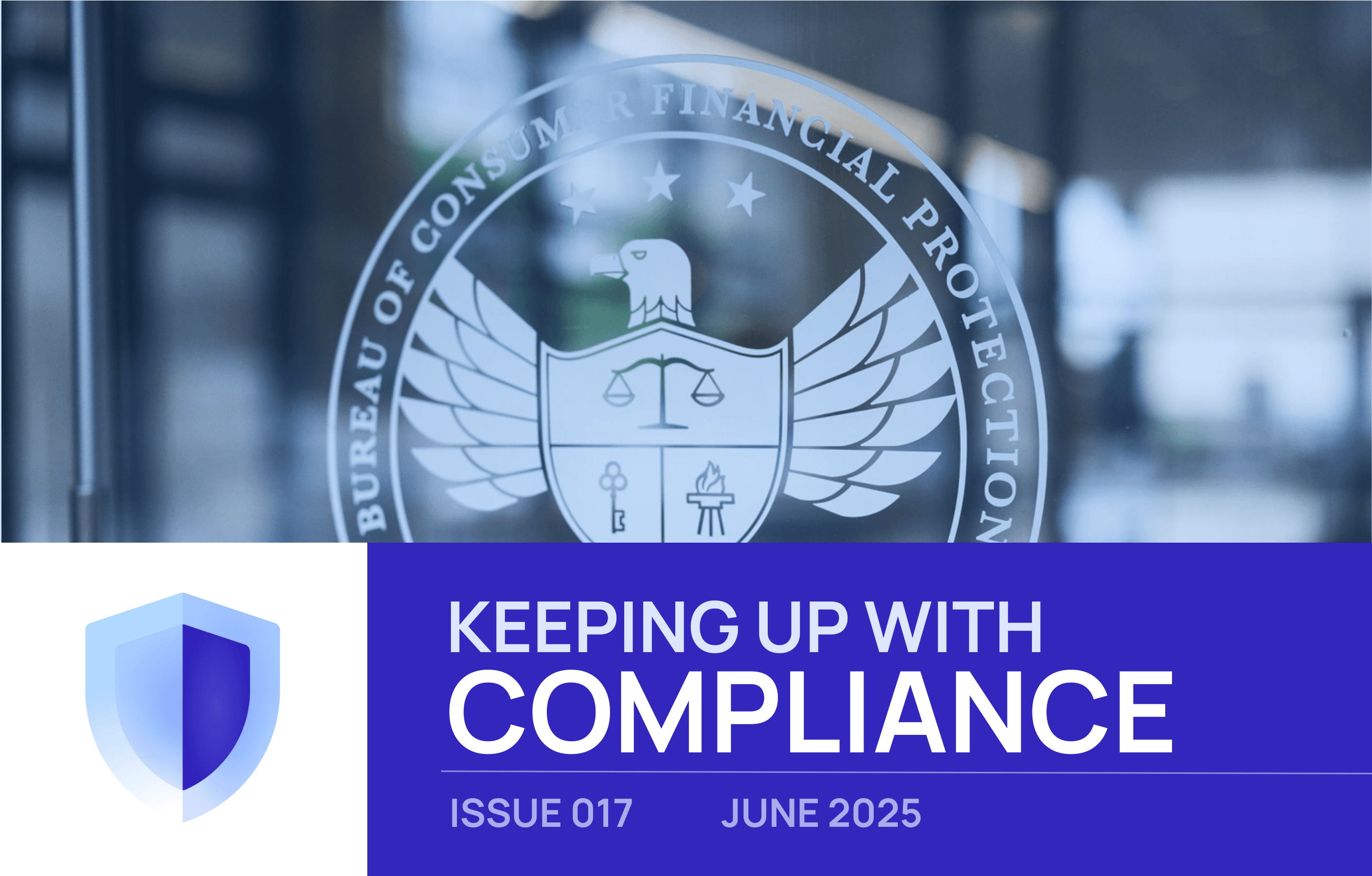Compliance & Fintech News — November
This is the first post of LoanPro’s Compliance & Fintech Newsletter, bringing you news from across the industry with a focus on compliance. Expect new editions monthly.
LoanPro Compliance Spotlight
Did you know that LoanPro’s event- and trigger-based notification features can help our customers easily comply with the CARD Act’s notification requirements by automatically sending required written notices?
Compliance Actions & Changes in the Industry
- The Consumer Financial Protection Bureau is proposing to supervise larger nonbank companies that offer services such as digital wallets and payment apps.
- Online lender Enova International Inc. was fined $15 million for making deceptive statements about loans, withdrawing funds from consumer bank accounts without permission, canceling loan extensions, and violating a previous order from the CFPB.
- Debt collectors should be cautious not to run afoul of the Fair Debt Collection Practices Act when collecting on medical debt; thousands of complaints have been made regarding collection attempts for the wrong amount or for medical debt that has already been paid.
- Toyota Motor Credit Corporation was ordered to pay $60 million in consumer redress and penalties for preventing borrowers from canceling product bundles that increased their monthly car loan payments, withholding refunds on bundled products, and knowingly tarnishing consumer credit reports with false information.
- The CFPB has ordered Bank of America to pay $12 million for failing to ask mortgage applicants certain demographic questions, reporting that the applicants chose not to respond, and submitting the false information to the federal government.
- Citi was ordered by the CFPB to pay $25.9 million in fines and consumer redress for intentionally and illegally discriminating against credit card applicants the bank identified as Armenian American.
- Brigit settles on charges from the FTC for their deceptive “instant” cash advance product, which locked consumers into a $9.99 monthly membership that couldn’t be canceled.
- The Federal Reserve Board and the CFPB announced the dollar thresholds used to determine whether certain consumer credit and lease transactions in 2024 are subject to certain Regulation Z (Truth in Lending) and Regulation M (Consumer Leasing) requirements.
- First Fed Bank enters into a consent order with the FDIC over a fintech it developed through a joint venture due to “unsafe or unsound banking practices and deceptive and unfair acts and practices in or affecting commerce.”
Fintech News
- Credit card debt and delinquencies continue to rise; Americans now owe $1.08 trillion in credit card debt.
- Jelena McWilliams, former Federal Deposit Insurance Corp. Chair, airs concerns about whether the new third-party guidance regulators released for banks over the summer will allow BaaS and third-party partnerships to blossom.
- Moody’s Investors Service predicts that fierce competition, persistent losses, and regulatory constraints will push some players out of the BNPL market.
- Bank of America reports that credit card balances among small businesses are on the rise.
- Capital One is being sued by savers who claim to have been tricked into thinking they were earning the highest savings rate available.
- FedNow is preparing to complement the real-time payments (RTP) network. Federal Reserve Vice Chair for Supervision Michael Barr shares his comments on the matter.
- Mastercard has been approved for China card processing after years waiting for approvals from the Chinese government, allowing their joint venture Mastercard NUCC Information Technology to begin offering bankcard clearing in the country.
- A survey commissioned by the Online Lender Alliance showcases the negative impact New Mexico’s rate cap, which took effect in January of 2023, has had on consumers.
- In August of 2023, federal bank regulatory agencies requested comment on a proposal that would require large banks with total assets of $100 billion or more to maintain a layer of long-term debt, which would improve financial stability by increasing the resolvability and resiliency of such institutions. This comments period has been extended to January 16th of 2024.
- Blue Ridge Bank is shedding many of its fintech partners in an attempt to regain favor after its 2022 consent order.
- Economists largely agree that there’s a 50% chance of a recession in 2024. If that happens, the Fed is predicted to start cutting interest rates in the first half of 2024.
- Socure introduced its first-party fraud solution—Sigma First-Party Fraud—along with their First-Party Fraud Consortium. Founding members of the consortium include SoFi, Green Dot, Varo, Ingo, Dave and Public, amongst others.
- Banking Dive gathered insights from several bank and fintech executives in October to showcase the financial services industry’s perspective on the growth of bank-fintech partnerships and BaaS.
- After the messy break between Synapse and Evolve, Synapse has to find one or more FDIC insured banks to take on their Evolve clients and make the necessary notifications.
- Plaid has created a separate legal entity, which will operate as a consumer reporting agency (CRA).
- The use of retail—or closed-loop—cards has gone down significantly since 2015, while open-loop cards, also known as general purpose cards, have seen an increase.
- Apple has proposed a winddown of their credit card partnership with Goldman Sachs.
That’s it for the Compliance & Fintech news stories from November. With consumer debt on the rise, there’s more demand than ever for new and enticing credit programs. But lenders still need to be cautious that their products are likely to net a positive return: that rise in debt is paired with a rise in delinquency. What’s more, even temporary gains can be offset down the road by massive fines, penalties, and payouts from lawsuits if lenders run afoul of compliance and consumer protection laws. To keep up, look out for future issues of LoanPro’s Compliance & Fintech Newsletter at the end of each month.




